Samurai Champloo Anime Review

Samurai Champloo
サムライチャンプルー Samurai Chanpurū
Written and directed by 渡辺 信一郎 Watanabe Shin'ichirō
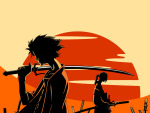
Samurai Champloo is the latest anime directed by Shinichiro Watanabe, the creator of Cowboy Bebop. Samurai Champloo is a period drama set in the Tokugawa Era, featuring two wandering swordsmen and a cute young girl on a rambling journey through Japan. There are obvious similarities between Watanabe's two series in their visual style and episodic structure. The soundtrack is also excellent, a hallmark of Watanabe's work. The hip-hop style of the music is remixed into the history of Tokugawa Japan, giving us rapping Yakuza and the privileged sons of master swordsmen competing to tag Osaka castle. This anime is also male-oriented. A "boy anime" as the Magistra said. She enjoyed it, but she didn't laugh as loud as I did. The extreme facial expressions and frequent violence tend toward the base rather than the artistic. Broadly speaking, if one liked Cowboy Bebop, which is one of the most accessible anime, then one would also like Samurai Champloo. It is not the best series I have ever seen, I don't think it would make my top ten list [although it isn't that far out either], but I liked it, and would recommend it.
Now, with that out of the way, I can talk about what really interests me. I fully intend to give everything away, so if for some reason you haven't seen this, and want to, stop reading.
After the first few episodes, I began to compare it to Rurouni Kenshin, but I don't think this is really the best comparison. Kenshin is my favorite anime, so that means that nothing else can really compare, but also Samurai Champloo is just a fundamentally different kind of anime. This is remix history. Much of the background in Samurai Champloo is based on real events, but twisted, like Fractured Fairy Tales. Also, the way the violence is portrayed has a very different feel. Kenshin made sword fighting beautiful, whereas the fights in Samurai Champloo are more matter-of-fact: nasty, brutish, and short.
Samurai Champloo is less about grappling with the swift changes that occurred during the Meiji Era and more about being along for a crazy ride.
I enjoyed that this anime went to places other than Tokyo. Anime is Tokyo-centric for the same reason that American TV and movies are NYC-centric: that is where the cultural center is, and also where many of the production companies are based. You just don't see other settings quite so often. However, since the narrative pull of the series centers on a trip to Nagasaki, you get to see a lot of places you don't normally see.
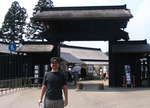
Me at the Hakone Checkpoint
I especially liked the episode at the Hakone checkpoint, because I recognized it immediately. I have been there. I must have missed the display on the revolutionary group that was growing marijuana in the mountains though.
Even though the history was remixed, I enjoyed it regardless because the setting and background are richer for the historical basis. If you know a little bit about the hidden Christians or Miyamoto Musashi, then the series is just that much more interesting. Of course, the usual warning about getting your historical knowledge from fiction applies even more strongly here.
Fuu フー, Jin 仁, and Mugen 無限 are the primary characters. Fuu is the center of gravity around which everyone else orbits. It remains somewhat mysterious why Jin and Mugen would do what she says, and they are fairly difficult for Fuu to handle, but nonetheless her journey is the cause of everything you see here. However, Jin and Mugen are the most interesting of the three; they are almost perfectly opposed, yet both embody the samurai stereotype. Jin is very much the prototypical Zen swordsman, but Mugen is chaos personified. Jin is proper and prudent as much as Mugen is coarse and reckless.Yet, they have an essential similarity despite their accidental differences of personality and upbringing.
The fun lies in seeing how each man came to be who he is, and the circumstances that brought them together. Neither Jin nor Mugen has much love for the Tokugawa regime, and this gives them both ample excuse to cleanse the earth of the many parasites that infested the static social order of Tokugawa Japan. They mostly kill bad people, or at least not noticeably good people.
Jin is a good deal more conscientious about who he kills, which gives us the phenomenon of suicide by Mugen. Everyone who wanted to die chose Mugen, probably since he is so transparently easy to provoke. However, that does not stop Jin from killing lots and lots of people. You could probably follow them around Japan just by looking for the bodies.
I also think Jin's secret technique is falling in the water and pretending to be dead. He uses it at least three times, and it keeps working for him. Not the most glamorous technique, but it is hard to argue with success.

The samurai who smells of sunflowersThe series moves at a meandering pace until the very end. I couldn't believe how much story was packed into the last two or three episodes! Things just came to head all at once. This was mostly a satisfying ending. Mugen's final battle was less fitting than Jin's; not that is wasn't a good fight, it is just that who he fought seemed superfluous.
I found that I actually cared quite a bit about Fuu and Jin and Mugen by the end. I really wanted to know what would happen, but I was emotionally prepared for them all to die, and found that I was pleased that they did not, even though it perhaps should have happened that way. I like it better when evil is vanquished, even if the story is less for it.
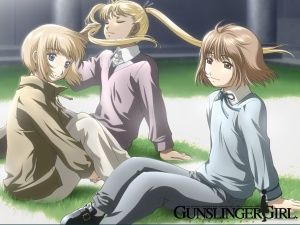
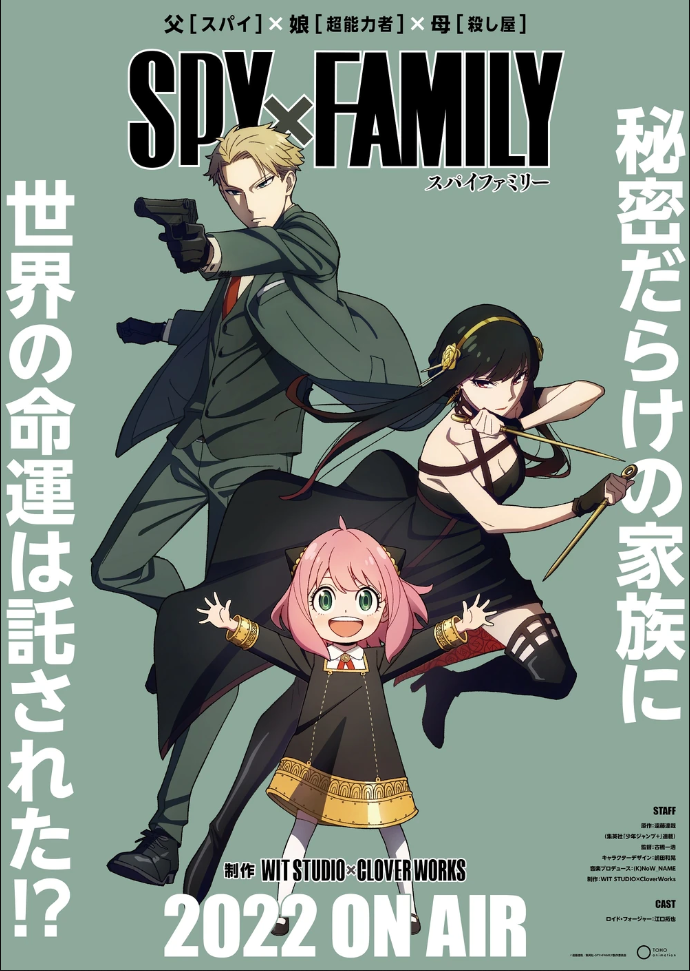
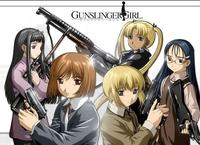
Comments ()